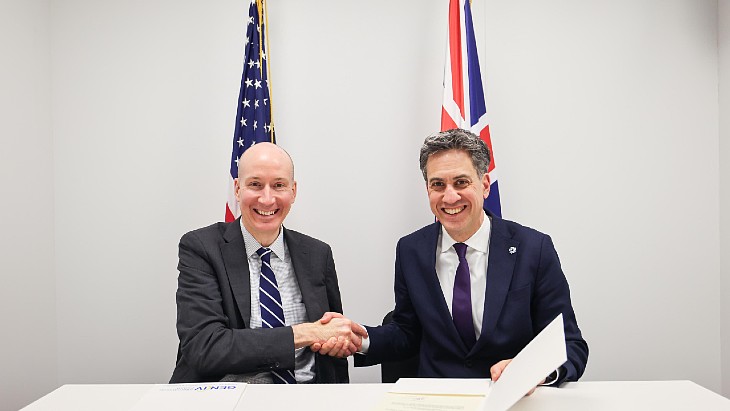UK Energy Secretary Ed Miliband and US Deputy Secretary of Energy David Turk signed the agreement at COP29 in Baku, Azerbaijan. The UK said the aim was to "support information-sharing on advanced nuclear technologies" and could see "billions" pooled in research and development.
Miliband said: "Nuclear will play a vital role in our clean energy future. That is why we are working closely with our allies to unleash the potential of cutting-edge nuclear technology. Advanced nuclear technology will help decarbonise industry by providing low-carbon heat and power, supporting new jobs and investment here in the UK."
The statement also said that the agreement would exclude Russia from the next phase of the Generation IV International Forum (GIF) - which was created in January 2000 and which is a grouping of countries who cooperate on research and development on next-generation nuclear energy systems, with the aim of making fourth generation nuclear available for deployment by 2030.
The forum's work has identified six reactor technologies for development: the gas-cooled fast reactor, the lead-cooled fast reactor, the molten salt reactor, the sodium-cooled fast reactor, the supercritical-water-cooled reactor and the very high-temperature reactor.
The current members are Argentina, Australia, Brazil, Canada, China, France, Japan, Russia, South Africa, South Korea, Switzerland, the UK, the US and Euratom (the European Atomic Energy Community).
The USA and the UK were the first two members to sign the new Framework Agreement - once a third country signs it the framework agreement will officially come into force on 1 March, 2025. Other members then have three years to take the treaty through their national decision-making bodies if they wish to continue to participate in GIF activities.
In total, 11 current GIF members are said to be likely to sign the new framework agreement, including Canada, China, France, Japan, South Korea, South Africa, Euratom and Switzerland. Australia, which does not have nuclear power, was on an initial list of those expected to sign the agreement, but a government spokesman was reported by the Guardian as saying that it was an "observer" and would remain an "observer".
The UK's Nuclear Industry Association welcomed the announcement that the US and the UK had signed the framework, with CEO Tom Greatrex saying: "This is a very important partnership between two countries committed to new nuclear .... nuclear has featured heavily at COP29 with over 30 countries joining the UK in committing to tripling global nuclear capacity. It’s important that we match the ambition of countries like the US that want to add an extra 200 GW of nuclear by 2050, and develop our own clear nuclear plan that builds industry confidence.”
How does a country become a member of GIF?
According to the Gen IV International Forum its specific goal is "the development of concepts for one or more Generation IV systems that can be licensed, constructed, and operated in a manner that will provide a competitively priced and reliable supply of energy to the country or countries where such systems may be deployed, while satisfactorily addressing nuclear safety, waste, proliferation and public perception concerns".
"Membership of a country to the Forum is decided by its present members (unanimous approval required) on the basis of the prospective country's nuclear programme, as well as its capacity to contribute to the development of Gen-IV systems. Members are expected to maintain an appropriate level of active participation in collaborative projects, such as the participation in at least one significant collaborative project."
Argentina and Brazil have the status of "non-active member", which is applicable "only in the case of GIF founding members that did not then sign and ratify the GIF Framework Agreement".







_55401.png)
_23009.jpg)






